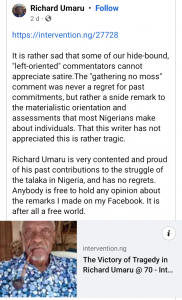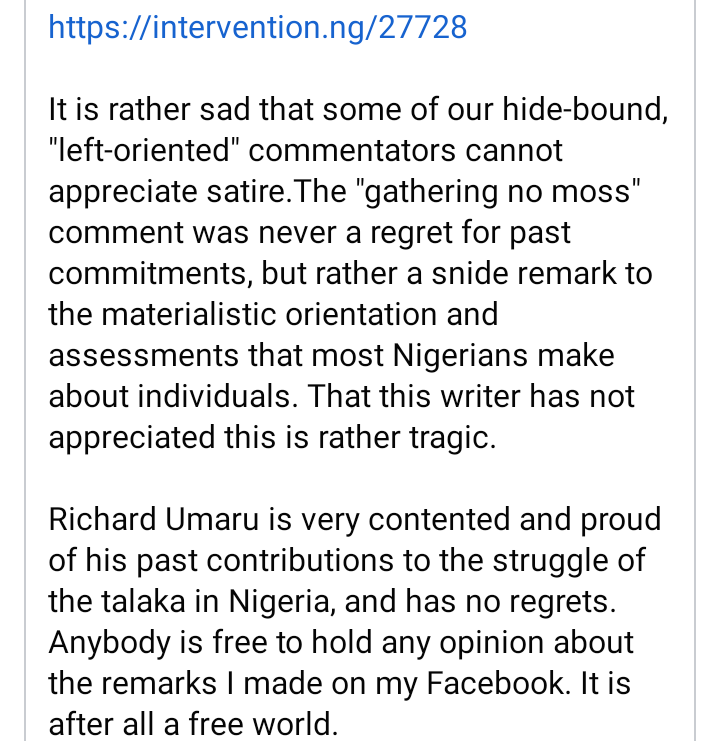Richard Umaru, a member of the ideologues behind the Balarabe Musa Government in Kaduna State of Nigeria in the Second Republic says he is contented and proud of his contributions to the struggle of the Talakawa, (the masses). Reacting to Intervention’s interpretation of a phrase he used on his Facebook page on his 70th birthday, the ideologue said it was a crisis of failure to appreciate satire that made Intervention to misread him. He says the phrase, “gathering no moss” was never a case of regret about his past commitments but an attack on the materialistic rating of individuals that he says Nigerians make. And that Intervention’s failure to appreciate it as such is rather tragic.

Screenshot of Richard Umaru’s reaction
Intervention is mightily happy to hear this from Cde Umaru. The platform picked the senior fighter on its radar within the context of its commitment to unveil all cases of “unheard screams” in a society like Nigeria where millions are alienated because of the chaotic organisation of the society. Otherwise, Intervention gains nothing from trying to frame Richard Umaru as suffering from misery in the evening of his life.
Aware of the multivalent character of language use, Intervention gave room at every turn in the script for the possibility of contrary meaning of the phrase. That is what sentences such as this which dominate the piece aimed to achieve: “…. meaning that it is a classical paradox if it is his material condition he is referring to in the idea of he having gathered no moss at 70”. So, Intervention anticipated and made room for the politics of meaning.
Secondly, Intervention argued that the story might have been on one person but was generalisable. Again, that is what this sentence was doing in the story: “What that means is that Umaru transforms into a puzzle beyond himself into the question of how those who are noble may not have to beg the smart guys before living contentedly in the evening of their life”.
The last line is that it is great hearing from the senior comrade that he is very fine and that he has no regrets. Others who were activists of some other campaigns whom we met and spoke with and/or read in newspapers are languishing away from any attention. Many of them are owed pension, mistreated by ‘big men’, blocked by their Others and so on or lack anything to do. It is on the basis of that Intervention created its section on “Unheard Screams” which is a major concept in the politics of emancipation. So, no evil intentions towards Umaru or anyone for that matter. It might be important for our readers to take note of what function every sentence is performing in every script.
For Intervention, the beat goes on without apologies.
Meanwhile, below is a reproduction of the original story on Cde Richard Umaru, the veteran’s veteran:
It is victory of tragedy when a Richard Umaru writes on his Facebook page on his 70th birthday that he has gathered no moss. It must be tragedy because the reference to moss in the single sentence on his Facebook page cannot be to the defeat of the ideological project he was part of under the late Alhaji Balarabe Musa Government in Kaduna State in the Second Republic. Umaru was one of the members of the BBUs, (students, lecturers and close associates of the late Bala Usman of the Department of History at the Ahmadu Bello University, Zaria in those days) that provided the intellectual cum ideological lenses by which the Balarabe led People’s Redemption Party Government played out against its National Party of Nigeria (NPN) opponent in the old Kaduna State. Of course, the fierce encounter ended with the impeachment of the governor and the displacement of the intellectual crew that underpinned it.

The late Dr Yusuf Bala Usman, leader of the intellectual crew behind the Balarabe Musa governorship of Kaduna State in the Second Republic
That is unlikely to be what Umaru is referring to in the gathering no moss analogy. If Intervention is correct, then the word tragedy in the title of this piece refers not to that moment but to the likely material condition of Umaru as he turns 70. Again, if this is a correct reading of it all, then it is a very sad reality.
It is so because it contradicts everything we have been told in that regard which is that hard work ensures success. Even his participation in the Balarabe Government alone entitles him to an A score in hard work, meaning that it is a classical paradox if it is his material condition he is referring to in the idea of he having gathered no moss at 70.
What that means is that Umaru transforms into a puzzle beyond himself into the question of how those who are noble may not have to beg the smart guys before living contentedly in the evening of their life. Interestingly, this is a question that every generation in Nigerian has been trying to confront. Intervention recalls how it played out between the late Chief Sunday Awoniyi and then General Olusegun Obasanjo. Awoniyi, one of the super Permsecs in those days under Obasanjo’s first coming as military Head of State was worried after the ‘great purge’ under Murtala/Obasanjo regime. The puzzle the perceptive Awoniyi took to the Commander-in-Chief was something like this: you have sent away those you said are bad and left those you said are good in the civil service but you have no way of stopping those bad ones from using their inside knowledge of the system to their own advantage and overwhelming all of us as well as the system later. Well, Obasanjo had no answer to the puzzle at the time. It is not clear now if he ever came back to the question.

Not only the tough minds who served it in the Second Republic, the party itself seems swamped by the turbulence of Nigerian politics this time
The logic of the narrative is the system has been swamped by those who have no qualms taking away the umbrella from the real owners and exposing them to the elements. The smart guys are at two levels. The political leaders who should have worked out a fairer system that responds to the kind of situation an Umaru must be in today. The second level is the large contingent of people who are hitting the system back today in reaction to one ill-treatment or the other. Or who are hitting back at the system which gave them outlandish sense of entitlement that it, (the system) cannot fulfil. Otherwise, how does anyone explain the outlandish, cowboy character of corruption in Nigeria today?
But there’s also the specific to the general. Radical activists in Nigeria generally pay very little attention to securing the personal future. Apart from the few in the professions, particularly law, architecture and politics, very few others anticipate and colonise the future in material terms. Many therefore become desperate only after the age of 50 when family responsibilities double down. It is worse if health issues add to daily survival at this age. Some respond to this by joining any government that makes an offer of appointment or degenerate into what was unthinkable.
The exceptions would be those who started early with children and are lucky to insert a discerning son or daughter into the system. Or, again, the very, very few who innovated by converting skills into something that could bring money without having to beg. The last category are those who kept retooling themselves as to be in a position to have something to do in terms of fallback! That is, those who could do like Claude Ake – scholars who are self-sustaining without begging anyone.
Whatever the case, the sense of regret in Richard Umaru is regrettable. He fought a great battle and, no matter what might be happening to him today, he has no cause to feel somehow. Anyone who was associated with some of the ideological stuff churned out by the Balarabe Musa Government should permanently feel fulfilled. It is still the best run state government in the history of Nigeria and he was in power for just two years and there were no commissioners. This is not to talk of the fact that almost none of the members of that crew has made money. Even Mallam Lawal Batagarawa who later became a minister may not be such a rich man today. So, there is a past for Richard Umaru to be proud of.
Nigerians are very egalitarian and it will not be very surprising if some people rush with assistance to Umaru after reading his Facebook outing. That is one possible response to his condition if the word moss were referring to daily survival crisis in the evening of his life. It is surprising that he is not a reserve academic in one of the universities, given his wealth of knowledge about much of the academic themes. If 77 year-old are in the race for the more challenging job of the president of Nigeria, US and so on, why might 70 be a year of despair for a warrior like Richard Umaru?




























